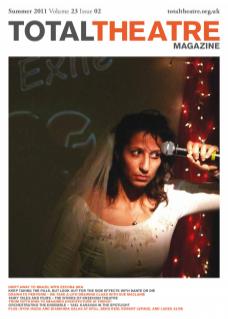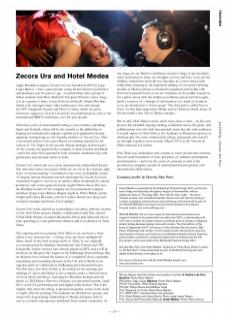Anglo-Brazilian company Zecora Ura was founded in 2001 by Jorge Lopes Ramos – then a precociously young theatre director, performer and producer, just 18 years of age – in partnership with a group of fellow students from Rose Bruford’s European Theatre course. Jorge, it is no surprise to learn, comes from an artistically vibrant Brazilian family, who (amongst many other endeavours) own and manage the CPC Gargarullo theatre and Ponto de Cultura, which has given enormous support to Zecora Ura and its associated projects, such as the international DRIFT residencies, over the past decade.
After three years of international touring to ten countries (including Spain and Iceland), others fell by the wayside as the difficulties in keeping an international company together post-graduation became apparent, leaving Jorge as sole founder member of Zecora Ura. After a six-month retreat to his native Brazil, researching material for his version of The Tempest in the (mostly African heritage) northern part of the country, he registered the company in both London and Brazil – and it has since then operated in both countries simultaneously, with performers and associate artists in both.
Zecora Ura’s stated aim is to create international, multicultural theatre that ‘provokes active encounters which are set out to de-construct rigid views of theatre-making’. Committed to the (very un-English!) notion of lengthy, intense theatrical research and longevity, Zecora Ura have sometimes fought to survive in an artistic culture dominated by annual ‘premieres’ and venues geared towards regular 90min shows. But now the Brazilian branch of the company has five permanent company members (Jorge Lopes Ramos, Raquel Aguilera, Flávio Rabelo, James Turpin and Carlos Rezende), and the London branch two (Jorge and company manager/performer Lisa Lapidge).
Zecora Ura’s work entered an extraordinary new phase with the creation of the Hotel Medea project, initially a collaboration with Para Active’s Urban Dolls Project, founded/directed by Persis Jade Maravala who is now operating as a solo performer/director and is co-director of Hotel Medea.
The ongoing and ever-growing Hotel Medea is, on one level, a show (albeit a very unusual one) – a trilogy that runs from midnight till dawn, based on the dark revenge myth of Medea. It was originally co-commissioned by Salisbury International Arts Festival and CPC Gargarullo. Earlier versions have already played at LIFT, and it will be shown in its full glory this August at the Edinburgh Festival Fringe. But its directors have resisted the notion of a ‘completed’ show, constantly researching and reworking elements in the UK and in Brazil, in an ongoing spirit of collaboration, challenging given theatrical mores. The first part, Zero Hour Market, is the setting for the meeting and marriage of Jason and Medea as the company create a ‘frenzied maze of food, blood and dance’, featuring live Brazilian rhythms and the talents of DJ Dolores. Part two, Drylands, was presented recently (April 2011) at GLAZ performing arts and digital media festival. This is the chapter that, when the trilogy is presented together, comes in the dead of night, after the partying. The audience are divided into groups, and witness the degenerating relationship of Medea and Jason (who is cast as a cynical contemporary politician) from myriad viewpoints. At one stage, we are Medea’s confidants, treated to slugs of gin (mother’s ruin!) and invited to share our thoughts on love and loss; or we are her children, tucked into bed with hot chocolate in a room strewn with teddy bears, listening to the anguished clicking of our nurse’s knitting needles as Medea’s privacy is invaded by paparazzi and mobile calls from her husband’s lover; or we are ‘members of the public’ bussed in for a photo-shoot with the ambitious politician, Jason; and then again, passive receivers of a barrage of information on a bank of monitors as we are formed into a ‘focus group’. The third part is called Feast of Dawn. As first light approaches Medea and her Maid are finally alone. In the aftermath a new side to Medea emerges…
But as said, Hotel Medea is more, much more, than a show – its five-year process has included ongoing training, residencies across the globe, and collaborations not only with international artists but also with audiences. A crucial aspect of Hotel Medea is the Audience as Document project, in which people who have witnessed the trilogy and people who haven’t are brought together, most recently (March 2011) at the Victoria & Albert museum in London.
Hotel Medea was undertaken with a desire to create theatre that stretches beyond usual boundaries of time and place, of audience participation and interaction – and in its five years of existence to date it has provided an exemplary model of multicultural theatre practice and international collaboration.
Hotel Medea is presented at the Edinburgh Festival Fringe 2011, performed each Friday and Saturday throughout August at Summerhall, with an additional show on Thursday 25th. From 23:45 every night – the show finishes at dawn and includes breakfast. Zecora Ura will also be hosting a number of debates, performances and workshops at Summerhall as part of the ROUTE BRAZIL-116 project launch (further details of this below). To book tickets, see www.edfringe.com
ROUTE BRAZIL-116 is a new model of international performance and research festival to be produced bi-annually from 2011, in partnership with LIFT and a number of London venues and which aims to create an imaginary artistic bridge between global cities and London. The first edition of the event in September 2011 will focus on links between Rio de Janeiro, São Paulo, Edinburgh and London. It will include artistic interventions, practiceled-research sessions, performance, and debates between festival directors, policy-makers, producers, artists and audiences from Brazil and the UK. The project will be launched at the Edinburgh Festival Fringe 2011.
Dorothy Max Prior saw Hotel Medea: Drylands at Trinity Buoy Wharf, London, on 22 April 2011. It was presented as part of GLAZ performing arts and digital media festival: www.glaz.co.uk
For more on Zecora Ura and the Hotel Medea project see www.zecoraura.com

